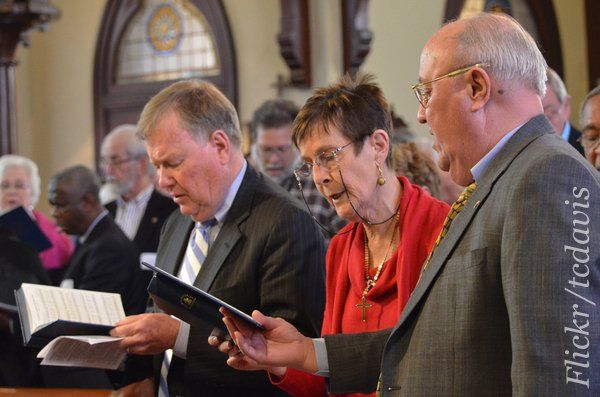Society today knows little of the gospel. Churches are seen as places for weddings and funerals. Many think that the regular church services cater mainly for the elderly and feature obscure rituals and boring preaching. Nevertheless, we have a mission-field next door. A Christian may be the only resident in his street who attends a church.
But witness to neighbours is difficult. Our ways may be unfamiliar to them. How can we introduce them to our services and to our Saviour?
Misconceptions
Mr Average has acquired many misconceptions. He does not know the Bible and, even if he did, would disown the biblical miracles as mere fables. He accepts evolution as a fact and either endorses or tolerates the godless standards of our permissive society. The church is considered benign but irrelevant.
But suppose we persuade a neighbour to visit our church; how will he react? He may be too kind to criticise but only his inward response will count.
Of course, the Lord can make things plain. We do not expect the ‘natural man’ to receive spiritual truth and we rely on the Spirit of God to open the eyes of the blind. Thus our prayers are the most important preparation for evangelism.
Nevertheless, some simple steps and safeguards can be taken to help a newcomer respond more favourably.

Are they welcome?
A stranger attending a church may well decide in the first five minutes whether to make a second visit! Are the stewards welcoming; are they neat (even if casual) and friendly? Is the building open, heated and clean? Are washrooms and toilets hygienic and fresh? A church may not have luxurious fittings, but paint, soap and clean towels are both inexpensive and essential.
Do people other than the stewards greet the stranger? We should. But in doing so, it is important to assess the temperament of a visitor and adjust our approach. A friendly word should be given to all, but a shy person can be embarrassed by a boisterous welcome, while an extrovert can be distanced by coolness.
Talk of general things. Don’t start by criticising other churches in the town. A short, quiet word of welcome is needed; not too much, not too little, but just right. Introduce the preacher.
A newcomer will attend a church where he is made to feel comfortable. He may know nothing of doctrinal differences and distinctions, and his greatest need is to hear the gospel of Christ.
Is worship understandable?
Most people are not used to hymn-singing and prayer, but they accept it in church. They may remember well-known traditional hymns and be glad to sing them. Modern hymns can be helpful but only if well-written, meaningful and musical.
Prayers should be simple, practical, and couched in language comprehensible to the ordinary person. In an evangelistic service one basic theme should remain in the memory. The use of a ‘theme chorus’ is not to be despised. For example, singing ‘There’s a way back to God from the dark paths of sin’, preparatory to a sermon on John 14:6, would fix the basic truth in the visitor’s mind.

Is the sermon clear?
Can the preaching be understood? Long words and abstract arguments confuse. Systematic sermon-series are edifying for the saints but not always the best evangelistic medium. The newcomer will be bewildered if faced with a discussion of Hebrew ritual and told that all will be made clear next Sunday! (He won’t be there to hear it). Deeper teaching can be focused on the midweek Bible study.
Churches should have regular occasions when the service is specifically evangelistic, welcoming, clear and basic. Such events afford opportunities for special invitations to our unsaved friends and create bridges into the more regular activities of the church.
There should, of course, be no compromise of truth. We do the visitor no favour if we tiptoe around the truth for fear of offending him. Evangelistic preaching should be direct, clear and challenging.
The preacher should communicate with his hearers, capturing their attention, preaching not lecturing. Preaching to the unsaved calls for a conversational style with a warm delivery that challenges personally.
Will the visitor return?
Will our visitors want to come again? They may thank us courteously for taking them to church but may not have been impressed. A good impression, on the other hand, will be indicated by willingness to return on another occasion.
Don’t burden a visitor with handfuls of literature. Many have lost the habit of reading, and a book, though graciously accepted, may remain unopened. Have a simple leaflet available to give if opportune, or a free copy of Ultimate Questions or something similar.
After a real interest has been established, a book or course on basic doctrine can be suggested. However, to propose a Bible course on a first visit might make the visitor feel pressured because it implies commitment to attending a series of meetings.
Nothing can replace regular attendance at preaching services. Remember that ‘it pleased God through the foolishness of the message preached to save those who believe’ (1 Corinthians 1:21).
The right balance of teaching and social activity can draw an enquirer closer.
Postscript
Friendship with a newcomer must be genuine and never used as just an evangelistic technique. A Christlike concern for the stranger or neighbour will be marked by sustained friendship, in all aspects of life, and by continuing, prayerful patience and sincerity.
‘He that winneth souls is wise’ – pray for that wisdom. For some, the message may be quickly welcomed; if so, be thankful. But most neighbours are not longing to hear the gospel; they have to be won.




